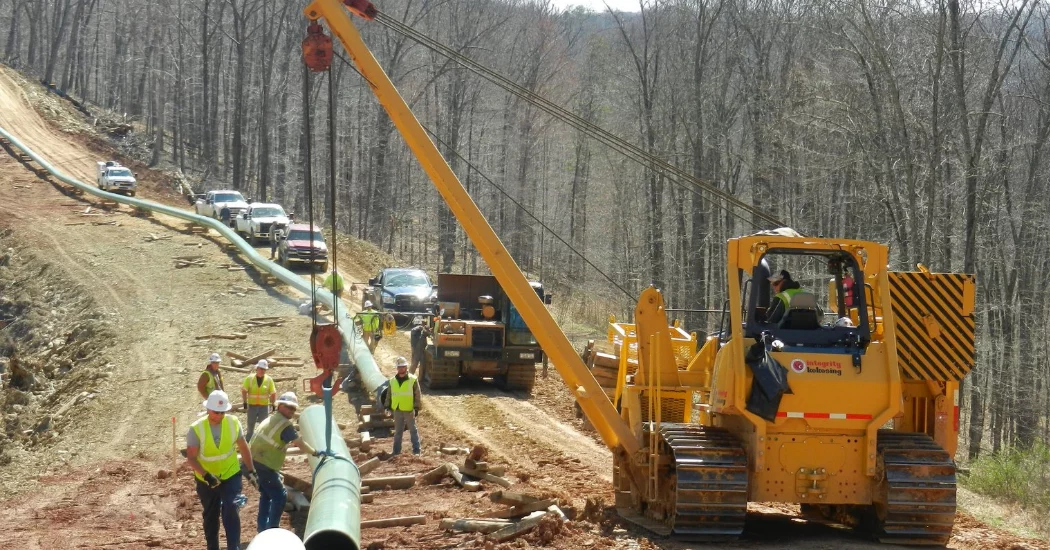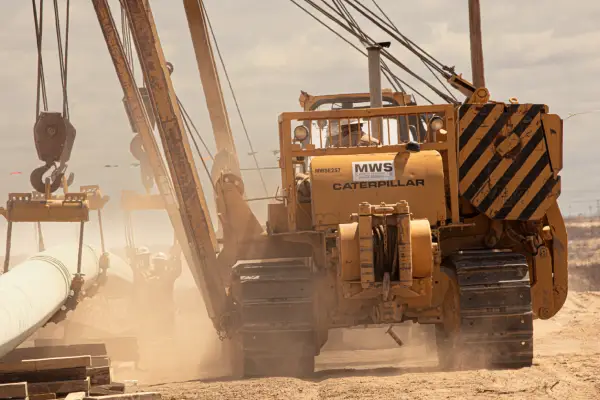Pipeline Construction Services: How to Align Budget and Quality
Wiki Article
The Essential Guide to Recognizing Pipeline Construction Solutions and Their Significance
Pipeline Construction services are basic to the transport of important resources such as water, gas, and oil. These services involve careful preparation and implementation, adhering to rigorous safety and security and ecological standards. As the industry adapts to modern difficulties, recognizing its parts and effects ends up being progressively crucial. What elements add to the growing value of these services in today's economic situation? The adhering to areas will certainly explore these crucial aspects.Overview of Pipeline Construction Solutions
Pipeline Construction solutions encompass a series of activities crucial for the installment and upkeep of pipelines used to deliver various compounds, consisting of gas, oil, and water. These solutions are important for guaranteeing the efficient and risk-free movement of sources from one place to another. The procedure commonly begins with complete planning and design, which takes into consideration regulatory needs, environmental factors to consider, and logistical difficulties.Excavation and grading of the land are carried out to prepare the site for Pipeline installment once planning is total. This is adhered to by the real laying of the pipelines, which involves welding or signing up with sections together to produce a constant flow path. After installment, strenuous screening is carried out to assure integrity and security. Upkeep services are likewise offered to attend to any issues that might emerge gradually. Overall, Pipeline Construction solutions play a crucial duty in sustaining infrastructure for power and water distribution.
Key Parts of Pipeline Construction
A successful Pipeline Construction project relies upon numerous key parts that guarantee the secure and reliable setup of the Pipeline system. Initially, thorough site analyses are vital, as they recognize the environmental and geographical elements that may impact Construction. Next off, the choice of appropriate products, such as pipes and fittings, is necessary for protecting resilience and compatibility with the transported compounds.Advanced Construction strategies, consisting of trenchless technology and directional drilling, enhance performance and decrease environmental effect. Effective project monitoring is one more vital part, working with labor, tools, and timelines to satisfy project goals.
Additionally, communication among stakeholders, including engineers, specialists, and neighborhood authorities, guarantees alignment on job specifications and needs. Finally, detailed quality assurance procedures throughout the Construction procedure guarantee compliance with industry requirements and optimize the Pipeline's functional life expectancy. Collectively, these components create the backbone of a successful Pipeline Construction task.
Security Criteria and Rules in Pipeline Construction

Improving Regulatory bodies, such as the Occupational Security and Health Management (OSHA) and the Pipeline and Hazardous Products Safety And Security Management (PHMSA), set forth specific requirements that regulate Construction techniques. These consist of procedures for tools use, employee training, and emergency reaction treatments. By carrying out these standards, Construction business not just shield their employees yet likewise protected public trust fund. Eventually, rigorous precaution contribute to the long-term success of Pipeline tasks, guaranteeing they meet both environmental and operational expectations.
Environmental Considerations in Pipeline Projects

Environmental considerations are indispensable to the planning and implementation of Pipeline tasks. These tasks should assess possible effects on ecological communities, water resources, and neighborhood wildlife. Performing extensive environmental influence assessments (EIAs) is essential, permitting stakeholders to identify and minimize dangers prior to Construction begins.
Shielding delicate locations, such as habitats and marshes, usually needs carrying out specific layout functions or alternate routing to reduce disruption. Furthermore, Pipeline operators are tasked with developing methods for protecting against spills and leaks, which can have destructive effects on the atmosphere.
Engagement with regional neighborhoods is necessary, as public worries can cause task modifications that enhance environmental security. Conformity with guidelines established by ecological firms assures that projects meet sustainability standards, fostering a balance between facilities needs her response and environmental preservation. Eventually, attending to ecological factors to consider not only safeguards nature but also promotes neighborhood trust and project practicality.
The Role of Innovation in Pipeline Construction
Technology plays a necessary function in contemporary Pipeline Construction, improving efficiency and accuracy. Advanced evaluating strategies permit for exact planning and execution, minimizing ecological influence and task hold-ups. Furthermore, the combination of automation and robotics improves operations, decreasing labor costs and enhancing security on Construction sites.Advanced Surveying Techniques
Advanced checking methods play a crucial role in the successful implementation of Pipeline Construction jobs. These techniques utilize sophisticated modern technology to assure accurate mapping and analysis of the surface where pipes will be mounted. Methods such as Geographic Information Equipment (GIS), LiDAR (Light Detection and Ranging), and 3D modeling make it possible for engineers to imagine and assess the landscape, identifying environmental issues and potential challenges. By utilizing these sophisticated tools, groups can improve precision ready and positioning, significantly minimizing the danger of mistakes during Construction. In addition, real-time information collection enables for immediate modifications and educated decision-making throughout the project lifecycle. Inevitably, these surveying advancements official source contribute to enhanced performance, safety, and sustainability in Pipeline Construction efforts.Automation and Robotics

Economic Effect of Pipeline Infrastructure
Pipeline framework plays an essential function in promoting and shaping regional economies trade. By giving a trustworthy means of transporting oil, gas, and various other commodities, pipelines decrease transport prices and boost supply chain efficiency. This infrastructure draws in financial investment, boosts work production, and fosters economic growth in surrounding areas.The Construction and upkeep of pipes add considerably to local economies, creating various employment opportunities in various fields, from design to labor. The increase of work commonly causes boosted costs in regional companies, even more reinforcing economic activity.
Additionally, pipes boost power protection by making sure a steady supply of resources, which is important for domestic needs and industrial operations. As regions become adjoined with Pipeline networks, they get to more comprehensive markets, boosting competitiveness and economic durability. The economic influence of Pipeline facilities is multifaceted, affecting both immediate neighborhood economic climates and more comprehensive local development.
Future Patterns in Pipeline Construction Services
The future of Pipeline Construction solutions is progressing in reaction to technical developments, governing modifications, and growing ecological considerations. Technologies such as robotics and drones are improving examination and maintenance procedures, improving safety and performance. Automation is poised to lower labor prices and enhance accuracy in Construction procedures. Furthermore, the enhancing focus on sustainability is triggering companies to embrace environmentally friendly products and methods, lining up with global initiatives to decrease carbon impacts.Regulative structures are additionally adapting to attend to ecological impacts, promoting better transparency and liability in Pipeline projects. The integration of smart technologies, including real-time tracking systems, is anticipated to boost the integrity more information and efficiency of Pipeline networks. As power demands change towards renewable resources, Pipeline Construction solutions will likely see a surge in projects connected to biofuels and hydrogen transportation. Overall, these fads indicate a transformative period for the Pipeline Construction sector, concentrated on technology and sustainability.
Often Asked Concerns
What Kinds of Pipelines Are Frequently Created?
Various types of pipes are commonly built, including oil, water, gas, and sewer pipes - Pipeline Construction Services. Each offers unique functions, promoting the transportation of crucial sources throughout regions while sticking to security and environmental regulationsHow Lengthy Does a Normal Pipeline Job Take?
The duration of a regular Pipeline job varies greatly, often varying from a number of months to a few years. Variables influencing this timeline include job complexity, governing authorizations, and ecological considerations that must be attended to.Who Manages Pipeline Construction Business?
Pipeline Construction companies are managed by various government, state, and regional firms, including the Pipeline and Hazardous Products Security Administration (PHMSA) and state public energy commissions, making certain compliance with safety and security and environmental criteria throughout the Construction process.What Prevail Materials Made Use Of in Pipeline Construction?
Common products used in Pipeline Construction consist of steel, pvc, and polyethylene. Each material uses distinct advantages such as durability, resistance, and versatility to deterioration, making them suitable for different applications in moving gases and fluids.
Exactly How Are Pipeline Construction Costs Estimated?
Pipeline Construction prices are estimated by analyzing variables such as product expenses, labor prices, job complexity, ecological considerations, and governing demands (Pipeline Construction Services). Accurate cost evaluation guarantees reliable budgeting and job planning throughout the Construction processPipeline Construction solutions include a variety of tasks necessary for the installment and maintenance of pipes made use of to deliver various materials, including water, oil, and gas. A successful Pipeline Construction task relies on numerous key parts that guarantee the efficient and safe installation of the Pipeline system. Advanced evaluating techniques play a necessary role in the successful implementation of Pipeline Construction projects. Different kinds of pipelines are frequently created, including oil, water, gas, and sewage pipelines. Pipeline Construction expenses are estimated by examining variables such as material expenditures, labor rates, task intricacy, environmental factors to consider, and regulatory needs.
Report this wiki page